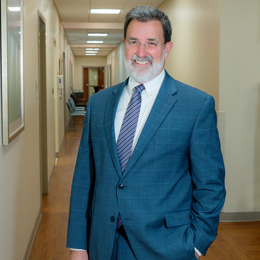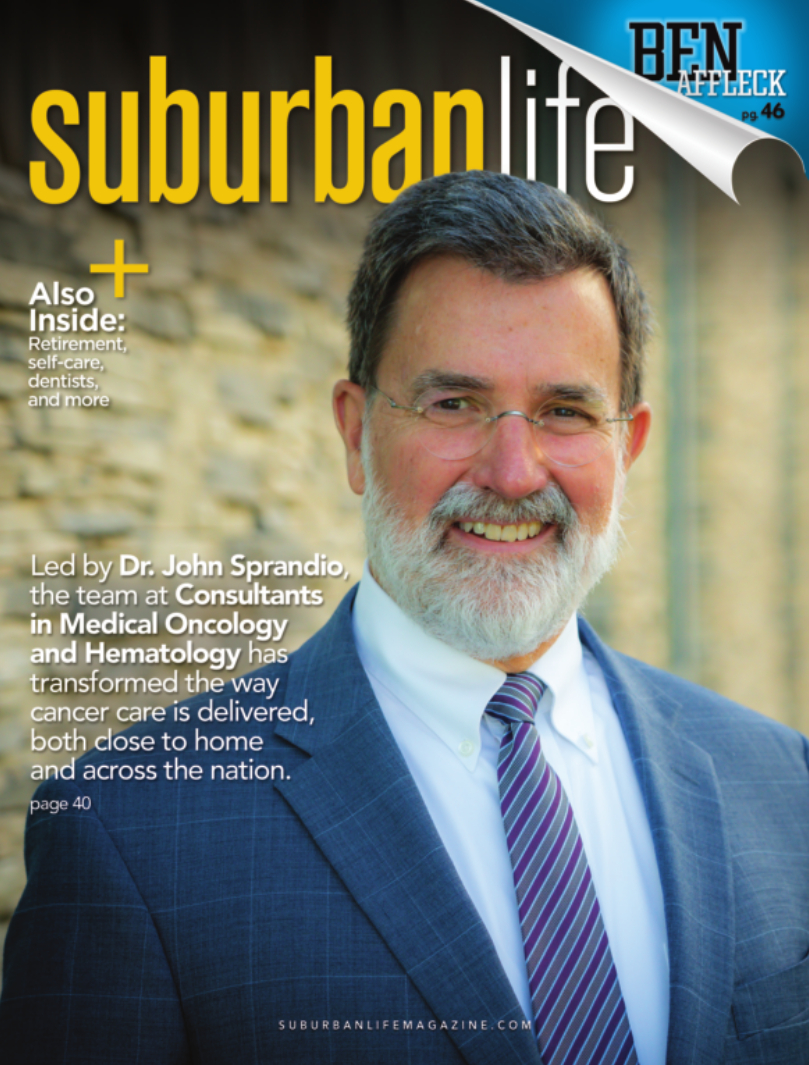
Pioneers in Cancer Care
Led by Dr. John Sprandio, the team at Consultants in Medical Oncology and Hematology has transformed the way cancer care is delivered, both close to home and across the nation.
Pursuing a career in medicine is commonly described as a calling, and more often than not the path to a very demanding yet fulfilling journey begins with a personal experience. For John D. Sprandio, M.D., inspiration first struck during his teen years, when he witnessed firsthand his father’s battle with acute leukemia. Even as a boy going through an extremely trying ordeal, he can remember being moved by the commitment of his dad’s healthcare team. Their dedication left a lasting impression on him, a future oncologist.
“I was close to my father, and I spent a lot of time with him during his nine months of illness,” Dr. Sprandio says. “My aunt was a nurse at the time, and she really coordinated his care. I saw how his physicians responded not only to him but to our family. Obviously, that had an impact on me, and it initially drew my interest to oncology. What I did not realize until later is that level of care driven by my aunt was not the norm—but I knew it should be.”
More than 30 years later, Dr. Sprandio is fortunate to be just as enthusiastic about helping patients today as when he first entered the field. The founder and president of Consultants in Medical Oncology and Hematology (CMOH)—an independent, community-based practice with 10 providers and locations in Broomall and Glen Mills—he has devoted his professional life to furthering the way oncologic services are delivered.
“My goal throughout all my years of practice has been to improve and standardize our level of service, in the way that I was first inspired to during my father's care: efficiently and empathetically, in every aspect,” he says.
To that end, Dr. Sprandio and the CMOH team have been pioneers nationally with their development of the Oncology Patient-Centered Medical Home. Initially conceived in 2005 as a method for reducing physician burnout, the approach to care gave valuable time back to the doctors through a more efficient collection of data and detailed documentation of patients’ symptoms and the solutions to treat those symptoms.
A byproduct of this physician-centric approach has been better and more consistent care for the patients. The holistic, personalized model streamlines treatment and brings the current health status of the patient front and center for each visit.
“There are a lot of buzzwords in oncology today, like personalized medicine, and to some healthcare providers that means checking your molecular studies and seeing if there’s a targeted therapy,” Dr. Sprandio says. “The science behind personalizing individual care from a drug perspective is critically important, and our sites obviously include that. But the way that we engage patients, the way that we collect patient outcomes and symptoms, and the way that we present those to our physicians and nurse practitioners at the time of the visit forms the basis for our extremely personal approach.”
The Oncology Patient-Centered Medical Home allows CMOH to prevent comorbid conditions from complicating and interrupting therapy. It also helps patients manage their symptoms, resulting in fewer emergency room visits and hospital admissions for patients.
The success of this model has not gone unnoticed; in 2010, CMOH became the first oncology practice to be recognized as a Level III patient-centered medical home by the National Committee for Quality Assurance (NCQA). The model has since influenced Medicare’s Oncology Care Model (OCM), a project engaging 180 practices across the country to reduce the exorbitant cost of cancer care while simultaneously increasing the quality of care.
Another groundbreaking aspect of CMOH’s approach is its focus on shortening “the timeline of uncertainty” before a cancer diagnosis is made. Traditionally, weeks and several doctors’ visits may pass between the time of a suspicious imaging study and an official diagnosis, which causes anxiety for patients and their families, and delays treatment. CMOH has adopted an “early handoff” policy, encouraging primary care doctors to refer patients with obvious or likely oncologic problems right away.
“We’re better versed at giving the patient an explanation, a prediction, and a plan,” Dr. Sprandio says. “We’re fully equipped to collaborate with the primary care doctor in getting patients to the surgeon of their choice, the specialist of their choice, and communicating with those folks to move this along and arrive at a diagnosis. We also take responsibility from Day One for symptom palliation so they’re not bouncing back and forth from the ER. When you shorten the timeline to diagnosis, obviously you shorten the timeline to initiation of treatment, and you shorten the misery of uncertainty that all of our patients face.”
CMOH also has strong relationships with National Cancer Institute (NCI)-designated centers in Philadelphia and other world-class providers in the region; it not only encourages second opinions, but also facilitates them. Patients may benefit from a clinical trial at those centers, but CMOH also has clinical trials available through The US Oncology Network, and more often than not people appreciate the personalized approach of Dr. Sprandio and his team.
The family atmosphere at CMOH has been bolstered by the addition of two of Dr. Sprandio’s sons: John David Sprandio Jr., M.D., a medical oncologist, and Brian Sprandio, M.D., a palliative care specialist. Dr. Sprandio is proud to have both on board, calling them “outstanding physicians and a great benefit to our practice.”
Not that he is quite ready to hand over the reins to the next generation, he assures. The way CMOH thrives on innovation and continuous improvement has only strengthened his commitment to medicine.
“After 33 years, I love my work more than I ever have,” he says. “I am not burned out; none of our physicians are. With the way that we’ve transformed our practice, we’ve given time back to our physicians so they can interact and engage better with our patients. I have no plans to retire anytime soon because we all know we’re doing something different than what’s generally happening in the market, and we’re all very passionate about it. I love what I do, and I think that I’m doing it better now than I ever have.”
For more information on Consultants in Medical Oncology and Hematology, which has locations in Broomall and Glen Mills, call (610) 492-5900 or visit CMOH.org.
Photograph by Jody Robinson
Published (and copyrighted) in Suburban Life magazine, October 2021.



